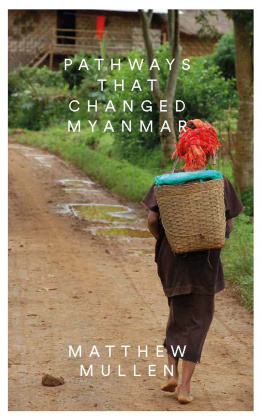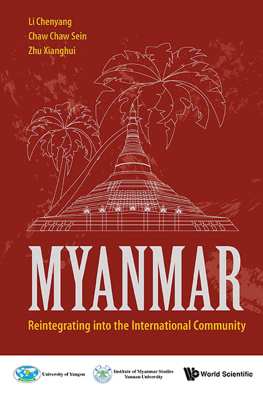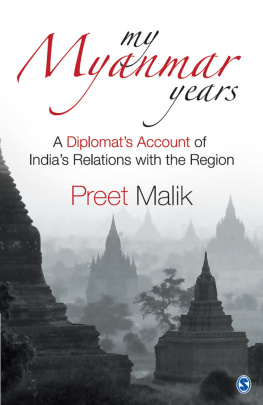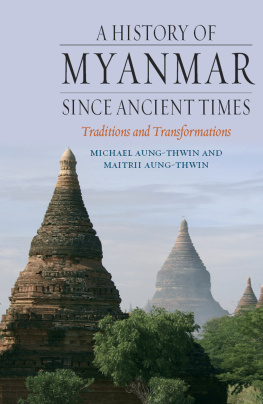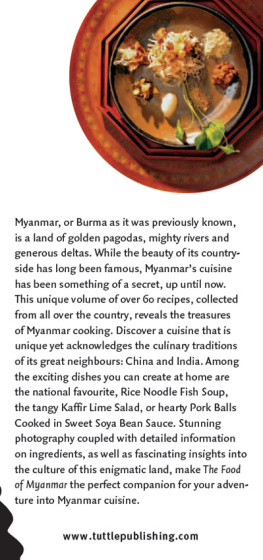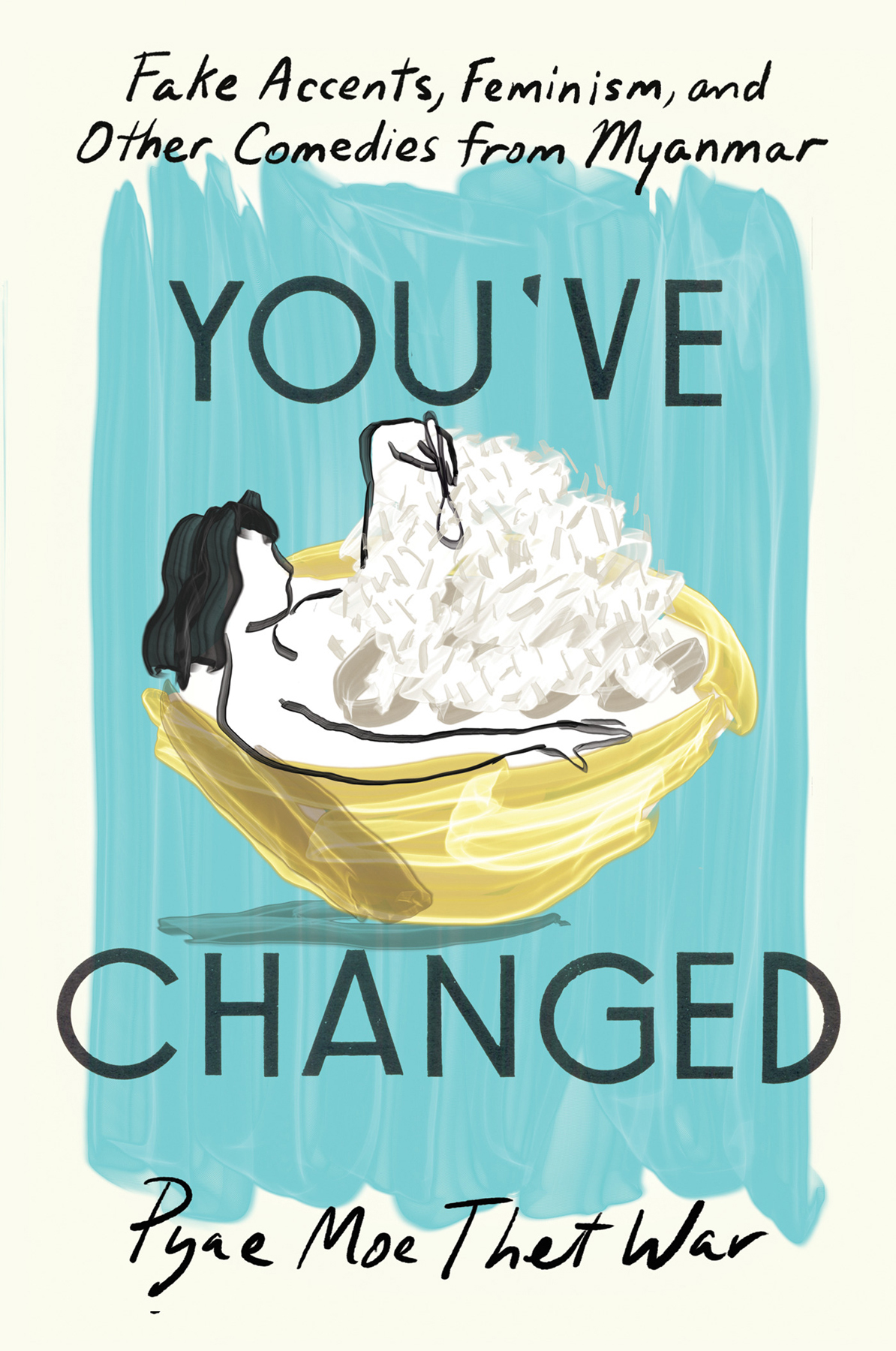Table of Contents
Guide
Page List
YOUVE CHANGED

To Mommy,
who took me to all the libraries and bookshops,
who let me store whatever book I was currently reading in her
purse no matter how heavy it was, and who believed that I
could and would write my own book one day, way before I even
believed it myself. I love you so much.
Contents
YOUVE CHANGED
I have two names, which is one whole name more than most people have. Ive been asked about it all my life. Usually I just smile and say, Its a long story. My legal namethat is, the one on my birth certificate and passport and other bureaucratic documentationis Moe Thet War, but everyone calls me Pyae Pyae (or Pyae, depending on how close we are). I guess technically the latter is a nickname, but it feels wrong to call it so. After all, my parents picked it out with as much careful consideration as they did Moe Thet War. Despite the number of times Ive had this conversation, its always a strange experience for me to explain the whole story to someone who doesnt get it. Whats there to get (or not get)?
The first time I visited my boyfriend Toothpicks hometown in the East Midlands of jolly ol England, his mother asked, But which one is your christened Christian name? What were you given when you were baptized? Even after multiple explanations, she and her Catholic upbringing couldnt quite grasp that I didnt have a christened Christian name. My parents are Theravada Buddhists, which means we dont have baptisms, or any religious name-giving rites of a similar nature. In Myanmar culture, people believe that a good name will bring good karma for the rest of that persons life. My parents, especially my mom, are also highly religious and superstitious, so when I was born, they went to a palm reader whom theyd been seeing for years, like a family doctor. The palm reader then made the types of calculations that only palm readers know how to make, and she produced a list of names that would assure a bright and prosperous future for me (my literature and creative writing degrees would say that it didnt work).
My parents only condition when they approached their all-knowing palm reader was that each of my potential names contain one of their names. They settled on Moe Thet War. I share the Moe from my dads name, just as I share his patient temperament, and the Thet from my moms, like I do her quiet but unyielding determination; I assume the War just worked out in the stars. Although I never use it except on official forms, I love this name because it feels like a concrete and constant reminder that, for better or for worse, my mom and dad are always a part of me.
Pyae Pyae was a separate yet seemingly equally complicated process, and it ties in with my siblings names. Pyae means full. My brothers name, Phyo, means grow, and my sisters name, Shan, means overflow. My parents named us in this order so that, as an entity, were first full of all the good things in lifewealth, health, happiness, love, et ceteraand then that number just keeps growing, until its finally overflowing. Do I think its a little over the top? Definitely, and I wonder how long they wouldve tried to keep this up if theyd had, say, eight children.
Like Pyae Pyae, the repetition of names is common in Myanmar culture; in addition to the example of my siblings, my grandmother, whom we call A May, is Myint Myint. In fact, all of my grandmothers sisters have names that are just two repeated words: Cho Cho, San San, and Ni Ni. Myint means high (to clarify: as in elevated), Cho means sweet, San means new or novel, and Ni means red. Unlike my parents, my great-grandparents did not have too much time on their hands to construct a story about their daughters being elevated, novel, sweet, and red. But you can tell that they did want their daughters names to reflect good things. My moms name, Thet, means life, and during one random fight over how my moms name came to be Thet Thet, A May sighed and said, What are you talking about? Of course I remember why I named you Thet Thet. Its because I loved my child more than life itself, so I was calling you my life. Mom didnt have a retort.
In spite of the amount of attention that your parents put into picking out your name, when I was growing up, there was a prevalent trend among my friends to pick out a Western nickname for themselves. My friend Khin can still recall when, on her first day of school, she was handed a book of alphabetized Western names to choose from, so as to help (cough, cater to) the American teachers at our school. Up until she graduated from high school, she went by Anna; I called her this for eleven years. She only ditched Anna once she went to the United States for college and wanted to ground herself more firmly in her cultural heritage, and it looks so weird to even write it out now. Ive technically known her as Anna for longer than Ive known her as Khin, but I cant even physically say the name Anna when Im talking to or about her anymore. Its a bizarre childhood anecdote that we ponder over from time to time: Who was Anna?
Theres a great sketch in Key & Peele where a class of high schoolers who come from predominantly white, middle-class backgrounds are one day taught by Mr. Garvey, a new substitute teacher who has spent his career teaching inner-city children. He begins class by going through roll call. Jay-KWAY-lin? he asks, as a young girl called Jacqueline attempts to correct him; Mr. Garvey refuses to believe that thats how the name is pronounced. Next, he calls on Buh-LAH-kay, who responds, My names Blake; Mr. Garvey throws down his clipboard and asks, Are you out of your goddamn mind? Next, he reads, Dee-nice, and the camera pans to a blond girl who is sheepishly looking around with her head down, unsure of if and how to respond. Finally, she says, Do you mean Denise? Mr. Garvey breaks his clipboard in half and demands, You say your name right, right now, and the girl again responds, Denise.
Say it right.
Denise?
Correctly?
Denise.
Right.
Denise.
Right.
Finally, Denise shakes her head, bites her tongue, and says, Dee-nice.
Mr. Garvey is satisfied.
Once when I was younger, I asked my mom if I could choose a new name. When she asked me why, I explained that none of my teachers ever knew how to pronounce it. I was privileged enough to attend an international school where one of the biggest selling points was that all the classes were taught by Westerners (usually from the United States, a few from Australia and the United Kingdom, and a handful from other predominantly white countries). My first-grade homeroom teacher was a woman named Ms. Win, and she was the only Myanmar head teacher I had. Each class also had an assistant teacher, and they were all Myanmar, but apart from Ms. Win, all the other head teachers were white. Of course, Ms. Win and the assistant teachers never had a problem pronouncing Pyae Pyae, but I instead focused on the fact that my white teachers just couldnt seem to make that one-syllable sound; they didnt know how to pronounce a lot of our names, but mine was always especially difficult. I hated the first day of the school year because during roll call Id have to brace myself for that awkward silence, followed by Um... Pie Pie? Id raise my hand and correct them with a weak smile, although most of them still wouldnt be able to pronounce it correctly.
How do you say it?
Pyae Pyae.



